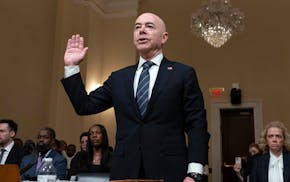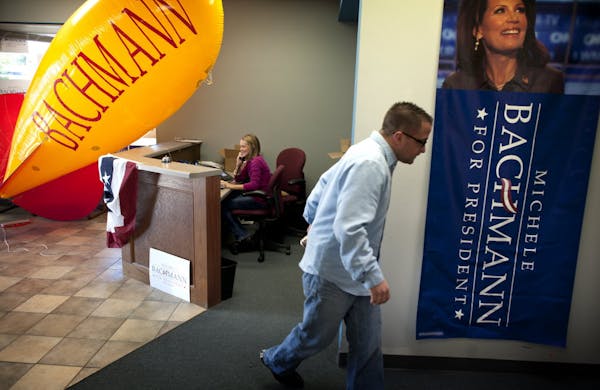WASHINGTON - It had all the marks of a third-rate burglary, except it would become one of the pivotal moments in U.S. Rep. Michele Bachmann's long fall from leading GOP presidential candidate to politician under siege.
With former aides turning against her, Bachmann's White House run now is under investigation by police and federal regulators from Iowa to Washington, where she is in the fight of her political life.
It started in the weeks leading up to the all-important Iowa caucuses. Somebody walked into Barb Heki's office inside the Urbandale headquarters of Bachmann's 2012 presidential campaign. That person — police still don't know who — allegedly got on Heki's personal computer and made off with a copy of a proprietary database of thousands of Iowa home-school families.
If it was an intel coup, it also would soon backfire, widening the cracks in a campaign already wracked by factionalism and bitter infighting.
Divisions at the top had already prompted Bachmann's New Hampshire staff to resign en masse in October 2011. Legendary GOP strategist Ed Rollins had abruptly quit in mid-September, accelerating the downward trajectory of Bachmann's summertime straw poll victory to her back-of-the-pack finish in the January 2012 caucuses.
That left the reins in the hands of Washington-based operative Keith Nahigian. He was best known as the advance man who set up the 1992 event where former Vice President Dan Quayle famously misspelled "potato." Another top adviser was master debate coach Brett O'Donnell. Whatever their talents, Rollins said, neither was a true political strategist.
"I think she outsources decisionmaking," said Florida evangelist Peter Waldron, a Bachmann campaign field coordinator who has become the public face of the dissidents, many of whom wonder how much the congresswoman really knew about the campaign consultants who were calling the shots day to day. "She defers good judgment to others who don't have good judgment."
Bachmann's finance chairman, Twin Cities businessman James Pollack, issued a statement Friday saying that the campaign had already dealt with the theft accusations by paying for the list. "It is reprehensible and outrageous for Peter Waldron to continue to infer baseless allegations against Congresswoman Bachmann, when she has done no wrong."
Bachmann, for her part, has denied any wrongdoing, telling reporters earlier this month that after all the questions have been answered, "I'll be cleared."
'We took it'
In an effort to shore up Bachmann's sliding fortunes in Iowa, the campaign hired Eric Woolson, a respected GOP operative from Des Moines who had helped engineer former Arkansas Gov. Mike Huckabee's Iowa win in 2008.
Two weeks after Woolson started as Iowa campaign manager, in early November, an e-mail was sent to home-school families on the list taken from Heki's computer. It was sent by Campaign Solutions, a D.C.-area firm run by self-described "online political pioneer" Rebecca ("Becki") Donatelli. The firm now also employs longtime Bachmann fundraiser Guy Short, who helped set up MichelePAC, Bachmann's independent political organization.
The e-mail, Woolson said in a later affidavit, "was the first … I heard about this situation."
Woolson, a veteran of Iowa politics, knew trouble when he saw it. He marched down the hall to see Iowa state Sen. Kent Sorenson, a local Tea Party figure who served as the campaign's state chairman.
"Do you want to know how it happened? Sorenson allegedly asked. "We took it." He then added the detail that the conspirators had "stood watch."
Sorenson has since denied Woolson's account, which was given in an affidavit in Heki's subsequent lawsuit against the campaign.
Woolson's affidavit also said that he took his concerns to Short, who was then serving as the campaign's national political director. He also talked to Nahigian and Bill McGinley, a prominent GOP attorney in Washington who still represents the campaign.
The Bachmann camp eventually put out a statement describing the use of the list as "inadvertent." They agreed to pay $2,000 in "rent" to Heki's home-school organization, to comply with federal election laws.
Meanwhile Heki, a lifelong activist in the home-school movement, was removed from her organization's board, a punishment she blamed on the lingering suspicion that she had misappropriated the list.
Waldron, the campaign's liaison to the religious community, was incensed. A global missionary with a mysterious past among gun runners in Uganda, Waldron had been involved in presidential politics since Ronald Reagan. Now his job was to persuade local pastors to stake their reputations on Bachmann, and he wanted Sorenson to come clean. In an e-mail to Woolson and Bob Heckman, a D.C. consultant who had hired him, Waldron wrote, "I owe it to my Lord, Michele, her Christian supporters, Barbara Heki … to do the right thing."
He also went to Bachmann and her husband, Marcus, meeting with them a week before Christmas in a Fort Dodge hotel room. The conversation was not limited to the theft of the e-mail list. Waldron said he also raised concerns about reports that Sorenson was getting paid for his campaign work, which for Sorenson would be a violation of Iowa Senate ethics rules.
By Waldron's account, the Bachmanns seemed troubled but unsure of how to respond.
But no action was taken against Sorenson. A few days before the caucuses, in one of the most dramatic defections of modern presidential politics, he bolted from the Bachmann camp and joined the surging Ron Paul campaign.
MichelePAC
By then, the Bachmann campaign was running out of money, and running Bachmann around the state on a grueling bus tour. The crowds were small. The momentum of the previous August was gone.
With the Jan. 3 caucuses approaching and the final push underway, some staffers working over the Christmas season said they were being asked to forgo checks. Among those owed money were Waldron and Minnesota GOP operative Andy Parrish, a former chief of staff in Bachmann's congressional office.
Short, however, was not going without pay — something that would not escape Waldron's notice later on. Subsequent checks with the Federal Election Commission (FEC) would show that while Short was technically volunteering for the campaign, his company, C&M Strategies, was getting paid $40,000 by MichelePAC.
In a complaint now before the FEC, Waldron alleges that Short was being paid by MichelePAC to work as national political director for the campaign, an arrangement that could violate financial limits on the PAC's contributions to the campaign.
Short's attorney, Christopher DeLacy, said the work Short was doing for MichelePAC was "completely separate" from the work he was doing for the campaign.
But the questions about Short also revived some of the lingering resentment about Sorenson. Three sources inside or close to the campaign have told the Star Tribune that Sorenson or his firm, Grassroots Strategy, was hired by Short to do work for the Bachmann campaign.
In complaints before the FEC and the Iowa Senate Ethics Committee, Waldron has alleged that Sorenson was being paid $7,500 a month through Short's firm, C&M Strategies. The source of those funds, according to Waldron, was MichelePAC. Altogether, FEC records show that C&M billed $165,000 for services rendered to MichelePAC over the 2012 election cycle.
'Shocked'
Until last week, Waldron was alone in making those accusations publicly, making it easy for Nahigian, O'Donnell and other top aides in the campaign to dismiss him as a "disgruntled" employee with a vendetta.
Now Parrish has stepped forward, agreeing to provide evidence to the Iowa Senate documenting the payments to Sorenson. Parrish, a longtime Bachmann protégé, is expected to provide an affidavit in the coming week. Parrish should know about the arrangement to pay Sorenson. According to Parrish's lawyer, John Gilmore, it was Parrish who recruited Sorenson into the campaign, and Bachmann was aware of the payments.
None of this, however, is expected to help Heki, an Iowa grandmother who said that Bachmann's continued public silence in the alleged e-mail theft "destroyed" her.
That public silence has been in marked contrast to the account Heki said Bachmann finally gave her in private.
That came at a staff luncheon the morning after the caucuses, when Heki says Bachmann told her that Sorenson had taken the database. "I was absolutely shocked," Heki said of the conversation. Woolson, in an affidavit, confirmed that he overheard the exchange.
In the absence of any public acknowledgment, Heki filed suit in Iowa against Bachmann and her top aides. Waldron, meanwhile, chose to remain silent during Bachmann's subsequent re-election campaign for Congress, a decision he said he now regrets.
After the elections, Waldron, Parrish and Heckman found themselves still owed money by the presidential campaign. In Waldron's case, it was a mere $916.67 — a pittance in a $10 million campaign.
The Bachmann political organization, a cash cow fabled for its fundraising ability, was good for the money but imposed a condition: To get their back pay, former staffers would have to sign nondisclosure agreements. Political operatives say that's typical in campaigns, though not necessarily a year after a campaign closes up shop.
Waldron refused, alleging that the campaign was attempting to silence him and others with evidence of wrongdoing. Instead, in January 2013, he went public with his complaints on a Christian wire service.
It was a case of a third-rate burglary no longer.
Kevin Diaz • on Twitter @StribDiaz
New Black congressional district in Louisiana bows to politics, not race, backers say
Trump trial jury selection process follows a familiar pattern with an unpredictable outcome
Climate change concerns grow, but few think Biden's climate law will help, AP-NORC poll finds

